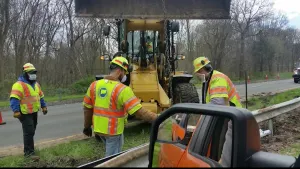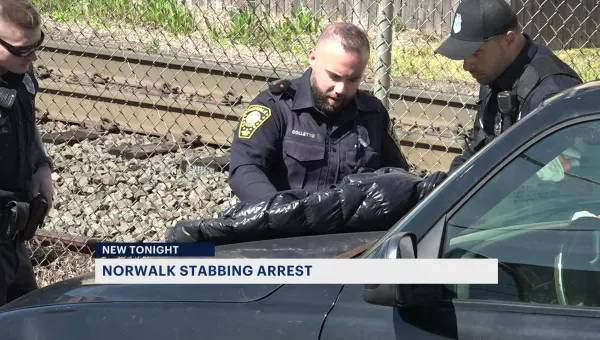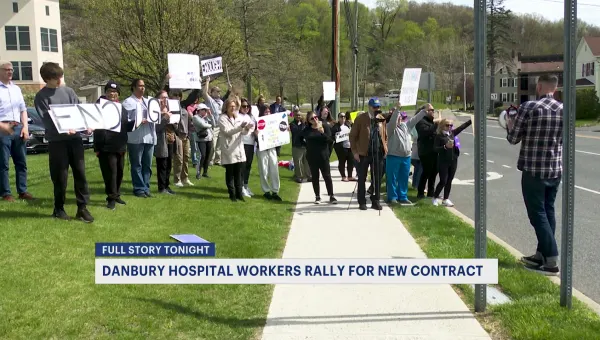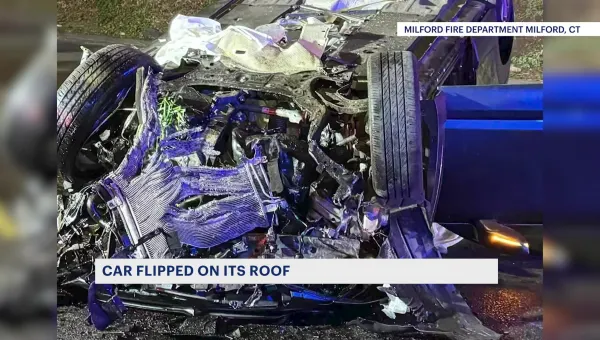‘Denied justice.’ Clean Slate Law delayed once again
It was a symbolic protest over yet another delay in Connecticut’s new Clean Slate Law.
Share:
More Stories
20:44

Power & Politics: Inside the raise for Connecticut state workers – too much or not enough?
7h ago1:58

New Haven police preparing for Sunday's pro-Palestinian protest on the Green
yesterday0:40

Stamford Mayor discusses future goals during State of the City address
yesterday0:22

Gov. Lamont says confirms his picks for the State Board of Education
2ds ago2:20

Republicans propose more money for schools, but cuts to immigrant health care
2ds ago0:39

Tuskegee airmen honored at the state Capitol
2ds ago20:44

Power & Politics: Inside the raise for Connecticut state workers – too much or not enough?
7h ago1:58

New Haven police preparing for Sunday's pro-Palestinian protest on the Green
yesterday0:40

Stamford Mayor discusses future goals during State of the City address
yesterday0:22

Gov. Lamont says confirms his picks for the State Board of Education
2ds ago2:20

Republicans propose more money for schools, but cuts to immigrant health care
2ds ago0:39

Tuskegee airmen honored at the state Capitol
2ds agoAs Easter approaches, the south steps of the state Capitol looked like a scene out of the Bible on Wednesday. Clergy members washed the feet of 12 formerly incarcerated people, just as Jesus was said to do for his disciples during Holy Week.
It was a symbolic protest over yet another delay in Connecticut’s new Clean Slate Law.
THIRD ROUND OF DELAYS
Just days before Christmas, Gov. Ned Lamont “wiped away” some 80,000 criminal convictions off a chalk board at a New Haven church. After a year of delays, he announced that Clean Slate would finally be fully implemented by late January.
For Helen Caraballo, it would finally open up doors in the nursing field.
“They loved me. I went to go do my fingerprints and never heard from them again,” she said. “Finally this happened, so I’m not going to be judged by my record anymore.”
But three months later, only 11% of all eligible records – impacting 13,600 people and 33,000 charges – have been cleared, according to the Connecticut Department of Emergency Services and Public Protection. The agency said that should jump to two-thirds in the coming weeks, but some people may be waiting another full year.
“Aging data systems and poor data quality have slowed the process down,” DESPP spokesperson Rick Green said in a statement. “The department anticipates that all eligible erasures, about 120,000 people and nearly 190,000 cases dating back to 2000, will be completed over the next 12 months.”
“DENIED JUSTICE”
On the state Capitol steps, clergy said washing the feet symbolizes the forgiveness that thousands are still waiting for.
“And we pray that there will be no washing of hands by our leaders and acts of cowardice or further delays of justice,” said Rev. Phillipe Andal, with Congregations Organized for a New Connecticut (CONECT). “There is really no such thing as ‘delayed justice.’ There is really only denied justice.”
The state has already invested $8 million in technology upgrades for Clean Slate, and Lamont has proposed an additional $1.5 million his latest state budget. Lawmakers also had to clarify parts of the law during last year’s legislative session.
But faith leaders said, it’s not enough.
“Now we come to the third big delay – again, based on data,” said Phil Kent, CONECT’s legal advisor. “The government has known that there would be data issues since before Clean Slate was passed in 2021.”
The group delivered a letter to Lamont on Wednesday, demanding a faster rollout.
“We want to staff up immediately and hire additional temporary staff to deal with the data issues,” said CONECT’s Rodney Moore.
Advocates said they didn’t even find out about this latest delay until they started asking questions. They want Lamont to set up a full-time Clean Slate Office to provide updates every few weeks – another idea that the governor proposed in the new state budget.
“We also want the government to bring in Code for America, who has worked with governments on data issues, so they can get this right,” Kent said.
CLEAN SLATE LAW
The Clean Slate Law was first passed in 2021.
Most misdemeanors will be automatically erased seven years after a conviction date, assuming the offender has not been convicted again. After a decade, minor felonies will also be erased – except for crimes involving family violence or sexual abuse.
Kent said many of the delays appear to be with former inmates who had a “family violence flag” on their records.
“Their records needs to be cleaned because a lot of people can’t even get good jobs or housing,” said Tanya Barr, with CONECT.
Under Clean Slate, only convictions occurring since the year 2000 are automatically erased. For convictions prior to that date, you must petition the court for erasure.





